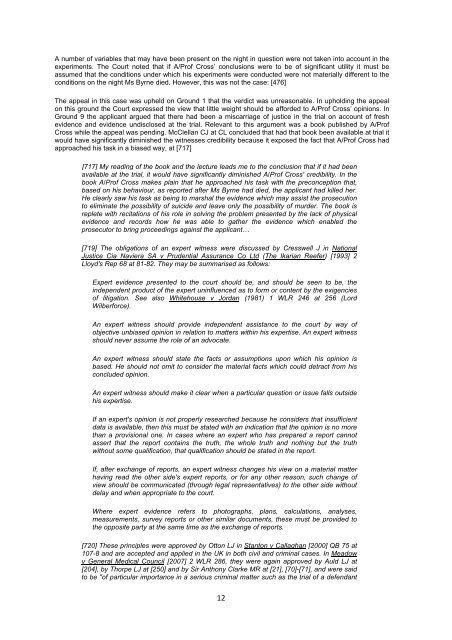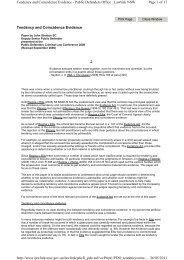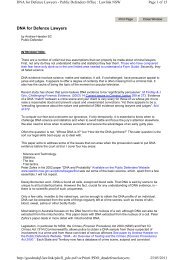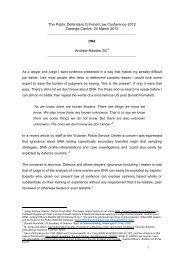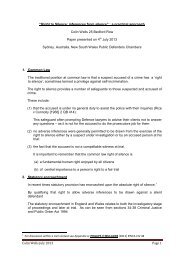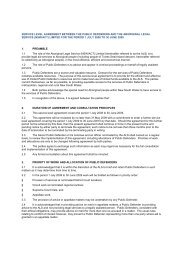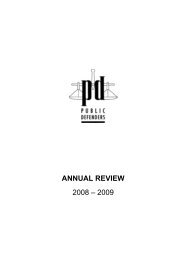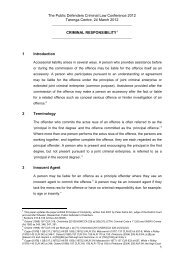Expert Evidence, by Dina Yehia SC - The Public Defenders
Expert Evidence, by Dina Yehia SC - The Public Defenders
Expert Evidence, by Dina Yehia SC - The Public Defenders
Create successful ePaper yourself
Turn your PDF publications into a flip-book with our unique Google optimized e-Paper software.
A number of variables that may have been present on the night in question were not taken into account in the<br />
experiments. <strong>The</strong> Court noted that if A/Prof Cross’ conclusions were to be of significant utility it must be<br />
assumed that the conditions under which his experiments were conducted were not materially different to the<br />
conditions on the night Ms Byrne died. However, this was not the case: [476]<br />
<strong>The</strong> appeal in this case was upheld on Ground 1 that the verdict was unreasonable. In upholding the appeal<br />
on this ground the Court expressed the view that little weight should be afforded to A/Prof Cross’ opinions. In<br />
Ground 9 the applicant argued that there had been a miscarriage of justice in the trial on account of fresh<br />
evidence and evidence undisclosed at the trial. Relevant to this argument was a book published <strong>by</strong> A/Prof<br />
Cross while the appeal was pending. McClellan CJ at CL concluded that had that book been available at trial it<br />
would have significantly diminished the witnesses credibility because it exposed the fact that A/Prof Cross had<br />
approached his task in a biased way, at [717]<br />
[717] My reading of the book and the lecture leads me to the conclusion that if it had been<br />
available at the trial, it would have significantly diminished A/Prof Cross' credibility. In the<br />
book A/Prof Cross makes plain that he approached his task with the preconception that,<br />
based on his behaviour, as reported after Ms Byrne had died, the applicant had killed her.<br />
He clearly saw his task as being to marshal the evidence which may assist the prosecution<br />
to eliminate the possibility of suicide and leave only the possibility of murder. <strong>The</strong> book is<br />
replete with recitations of his role in solving the problem presented <strong>by</strong> the lack of physical<br />
evidence and records how he was able to gather the evidence which enabled the<br />
prosecutor to bring proceedings against the applicant…<br />
[719] <strong>The</strong> obligations of an expert witness were discussed <strong>by</strong> Cresswell J in National<br />
Justice Cia Naviera SA v Prudential Assurance Co Ltd (<strong>The</strong> Ikarian Reefer) [1993] 2<br />
Lloyd's Rep 68 at 81-82. <strong>The</strong>y may be summarised as follows:<br />
<strong>Expert</strong> evidence presented to the court should be, and should be seen to be, the<br />
independent product of the expert uninfluenced as to form or content <strong>by</strong> the exigencies<br />
of litigation. See also Whitehouse v Jordan (1981) 1 WLR 246 at 256 (Lord<br />
Wilberforce).<br />
An expert witness should provide independent assistance to the court <strong>by</strong> way of<br />
objective unbiased opinion in relation to matters within his expertise. An expert witness<br />
should never assume the role of an advocate.<br />
An expert witness should state the facts or assumptions upon which his opinion is<br />
based. He should not omit to consider the material facts which could detract from his<br />
concluded opinion.<br />
An expert witness should make it clear when a particular question or issue falls outside<br />
his expertise.<br />
If an expert's opinion is not properly researched because he considers that insufficient<br />
data is available, then this must be stated with an indication that the opinion is no more<br />
than a provisional one. In cases where an expert who has prepared a report cannot<br />
assert that the report contains the truth, the whole truth and nothing but the truth<br />
without some qualification, that qualification should be stated in the report.<br />
If, after exchange of reports, an expert witness changes his view on a material matter<br />
having read the other side's expert reports, or for any other reason, such change of<br />
view should be communicated (through legal representatives) to the other side without<br />
delay and when appropriate to the court.<br />
Where expert evidence refers to photographs, plans, calculations, analyses,<br />
measurements, survey reports or other similar documents, these must be provided to<br />
the opposite party at the same time as the exchange of reports.<br />
[720] <strong>The</strong>se principles were approved <strong>by</strong> Otton LJ in Stanton v Callaghan [2000] QB 75 at<br />
107-8 and are accepted and applied in the UK in both civil and criminal cases. In Meadow<br />
v General Medical Council [2007] 2 WLR 286, they were again approved <strong>by</strong> Auld LJ at<br />
[204], <strong>by</strong> Thorpe LJ at [250] and <strong>by</strong> Sir Anthony Clarke MR at [21], [70]-[71], and were said<br />
to be "of particular importance in a serious criminal matter such as the trial of a defendant<br />
12


